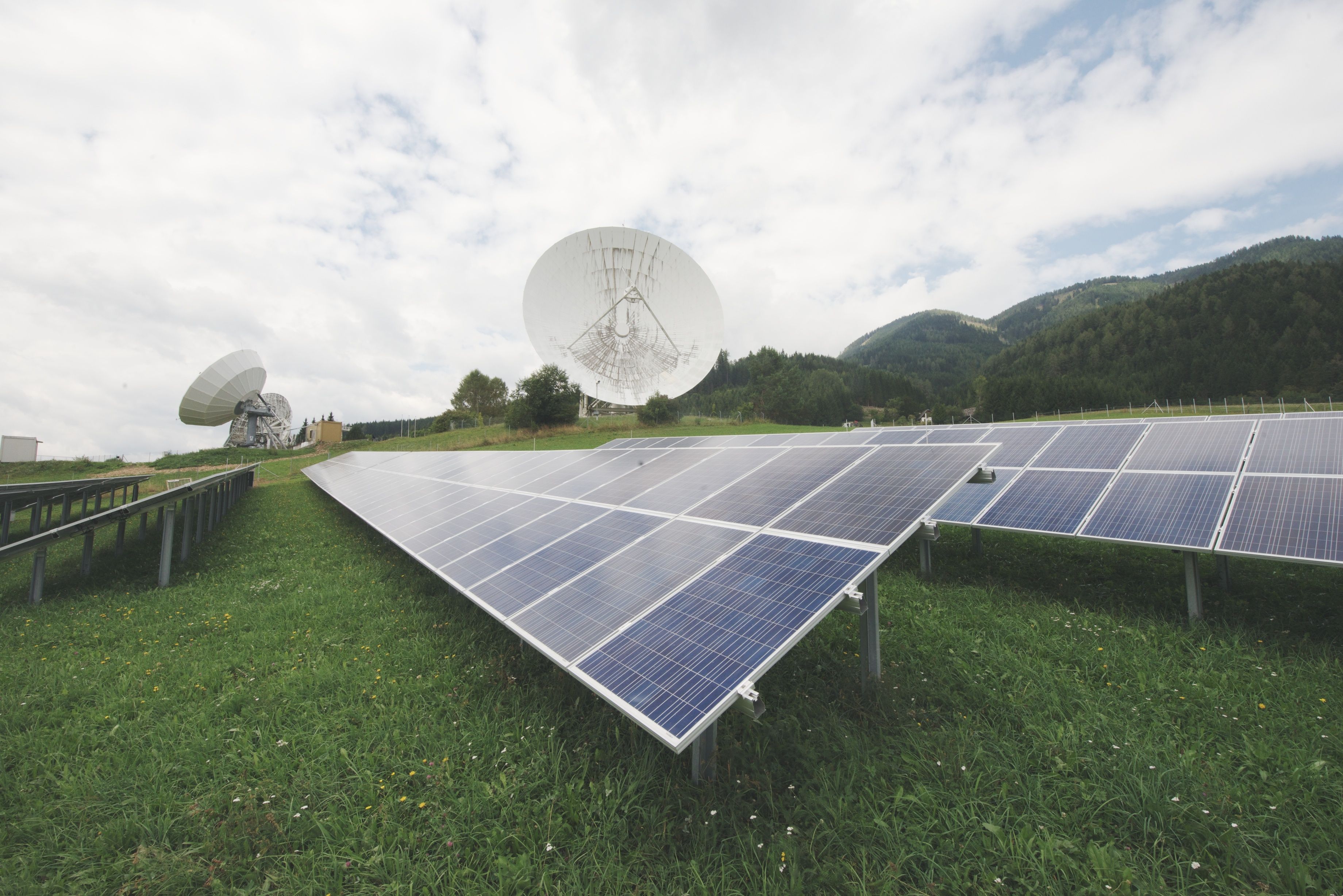Release of 04.09.2013
- Photovoltaic park will cover an area of 2,800 m2 and encompass a total of 462 photovoltaic modules
- Continuation of efficient energy supply strategy
- Annual reduction of CO2 emissions of approx. 50,000 kg
- The earth station Aflenz ranks among Europe’s largest satellite stations
Aflenz, September 4, 2013: To counter climate change, the Telekom Austria Group’s domestic subsidiary A1 is pursuing a clear energy supply strategy. In addition to enhancing energy efficiency, A1 is focusing on the deployment of renewable energy. Currently, the company is building a photovoltaic park directly on the premises of the earth station in Aflenz. The park will produce 110,000 kWh per year and the supplied energy is directly fed into the earth station Aflenz. In the first development phase, the photovoltaic park will achieve a total capacity of 113 kWp (kilowatt peak) reducing CO2 emissions by approximately 50,000 kg per year. This photovoltaic open-field plant will cover an area of 2,800 m² and encompass a total of 462 photovoltaic modules, which will be arranged in nine rows.
“As a telecommunication company, the energy consumption of our networks has one of the biggest environmental impacts for us. Therefore it is even more important to face this challenge with a clear energy supply strategy. We focus on energy-saving measures as well as on the enhancement of resource efficiency and on the use of renewable energy,” says Hannes Ametsreiter, CEO Telekom Austria Group about the project. “The creation of the photovoltaic park is a crucial step. The performance of 7,000 trees corresponds to an annual reduction of CO2 emissions of roughly 90,000 kg which we achieve in our second development phase.”
Data Transmission at the Speed of Light Via Green EnergyThe photovoltaic park adds an innovative and environmentally sound component to the architectural design concept of the Earth Station Aflenz, which is in harmony with nature. The site covers an area of 6,500 m² which provides space for state-of-the-art high-tech equipment for ultra-fast data transmissions via satellite. The earth station Aflenz encompasses a total of 50 antennas which send data at the speed of light to satellites located 36,000 km away. Via the satellite installation, the Telekom Austria Group offers a complementary solution to terrestric infrastructure if necessary as well as worldwide access to the data highway with state-of-the-art technology.
The earth station in Aflenz is part of the Telekom Austria Group’s Wholesale business unit and is therefore conncected to its Europe-wide backbone. Wholesale has earned an excellent reputation in the high-tech area, successful cooperation and longstanding partnerships with international carriers round off the company’s traditional voice business. The business unit Wholesale contributed with 493,3 Mio. Euros to the total revenues of the Group in the financial year of 2012. The earth station in Aflenz ranks among Europe’s largest satellite stations and is in operation 24/7. The radius encompasses an orbital loop that ranges between 55°west and 85°east, the area is interference free.
Renewable Energy Sources at A1A1 has operated a photovoltaic plant at its Arsenal technology center since 2010, which generates roughly 30.000 kWh. The company is also testing the use of photovoltaic systems on transmitter masts and telephone boots as an alternative energy source. In 2012, renewable energy sources, which mainly include Austrian hydropower, accounted for roughly 80% of A1 total energy supply. The company’s headquarters in Vienna, Graz and Salzburg are powered solely with green energy.
Sustainability at the Telekom Austria GroupIn addition to economic indicators and objectives, ecological and social aspects have been playing an increasingly important role in the Group’s business management in recent years. The foremost priority of the Telekom Austria Group’s sustainability strategy is to create more opportunities for everyone by using new technologies, while simultaneously reducing the consumption of natural resources and thus, the company’s ecological footprint. In addition to enhancing energy efficiency, the Group’s strategic focus across its operating companies is on a stronger use of renewable energy sources. For instance, more than 50 mobile base stations operated by Vipnet in Croatia are partially powered with wind and solar energy. Si.mobil has also followed suit, starting to test solar-powered base stations in Slovenia. Furthermore, Vipnet has received numerous awards – among others the ‘Global Telecom Business Innovation Award 2012’ and the ‘World Communication Award’ – for the implementation of a hybrid energy supply system for three remotely located mobile base stations that are difficult to supply. In 2012, Vipnet headquarters were equipped with a photovoltaic system that generates more than 37.300 KWh. In the Republic of Macedonia, Vip operator, in cooperation with the national energy agency, has installed solar-powered mobile phone charging stations in public locations to raise public awareness about the sparing use of energy.
